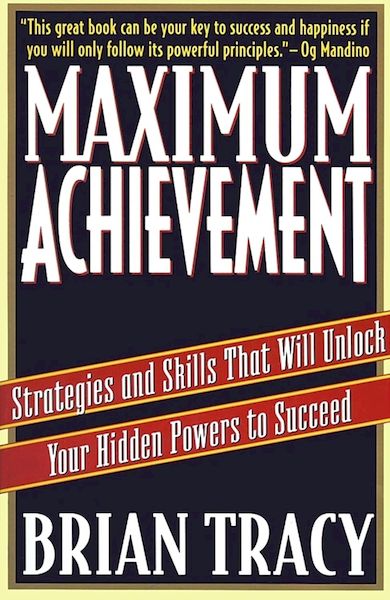Do you need help to be more fulfilled? Do you yearn to achieve more and unlock your true potential? Brian Tracy’s “Maximum Achievement: Strategies and Skills that Will Unlock Your Hidden Powers to Succeed” might be the key you’ve been searching for.
This powerful book, packed with practical advice and proven strategies, equips you with the tools to transform your life. Before diving into the complete text, see Tracy’s wisdom in the summary below. Take control of your destiny and unlock the hidden powers within you — start reading now!

- Key Points
- Summary ‘Maximum Achievement: Strategies and Skills that Will Unlock Your Hidden Powers to Succeed’
- The Seven Principles of Mental Command
- “The Mastery Program”
- “The Mental Mastery”
- “The Mastery Skill”
- Additional Mental Mastery
- Stress
- Interpersonal Relationships
- About the Author
Key Points
- Life is challenging, but you have the power to control your destiny. Accept life’s difficulties and move forward with a positive attitude.
- Set clear goals and believe in your ability to achieve them. Having a strong sense of purpose and self-belief is crucial for success.
- Develop a positive mental attitude. Your thoughts and beliefs shape your reality. Focus on the positive and eliminate negative thoughts and emotions.
- Take action and be persistent. Don’t let fear or procrastination hold you back. Create a plan, take consistent steps, and never give up.
- Build strong relationships. Focus on making others feel good about themselves and treat everyone with respect and love, especially your children.
Summary ‘Maximum Achievement: Strategies and Skills that Will Unlock Your Hidden Powers to Succeed’
Attainment of life mastery and achievement of your objectives hinge on these seven elements:
- “Serenity” – Inner peace opens doors to limitless possibilities.
- “Well-being and vitality” – The affluent prioritize health over material wealth.
- “Fulfilling relationships” – Content individuals foster nurturing relationships with family and friends.
- “Financial independence” – Aim for financial stability to alleviate concerns.
- “Meritorious pursuits and aspirations” – Give your life direction and purpose.
- “Self-understanding and mindfulness” – Who are you? Understand and acknowledge your essence.
- “Personal contentment” – Is your life a manifestation of your dreams and potential? Have you actualized your aspirations?
The Seven Principles of Mental Command
Life poses challenges. Accept this reality and swiftly transcend it. Cease mulling over limitations. Your dreams are within reach. Embrace these seven principles to master your attitude and life entirely:
- “The principle of authority” – Governance of your life leads to prosperity; otherwise, stress, tension, and ailments ensue.
- “The principle of causality” – Alter your perspectives to transform your reality.
- “The principle of conviction” – Regard yourself as triumphant. Envision defeat, and it shall prevail.
- “The principle of anticipation” – Life unfolds as foreseen. Uphold high expectations. Are your anticipations optimistic or pessimistic?
- “The principle of allure” – Are you a source of attraction or repulsion? Joyful individuals draw others near. Cultivate happiness to magnetize companionship.
- “The principle of concordance” – Inner prosperity resonates outwardly. “As within, so without.”
- “The principle of mental equivalence” – Do you perceive the world positively or negatively? Your thoughts shape your reality.
“The Mastery Program”
A positive outlook yields remarkable transformations. Attitude delineates perception. Your self-image shapes beliefs, which in turn mold expectations. This self-image serves as the linchpin of your life course. Does your self-image fortify or impede your progress? To enhance it, envision your future self aspired, not merely your present state. Adopt a constructive self-conception. Who do you desire to become?
Ensure that your self-perception and self-regard exude positivity. To surmount a negative self-image, inundate your mind with affirmative thoughts. To transform and reform your thoughts. Undertake a “Positive Mental Attitude” regimen for 21 days. Ponder only encouraging notions about yourself. Envision yourself as a victor, not a vanquished. Actuate this perspective. Engaging in change is facile with a determined mindset.
“The Mental Mastery”
Your mind’s prowess can access any opportunity. To unleash this power:
- Focus on your objectives.
- Concentrate your thoughts on your ambitions.
- Dedicate a full day, 24 hours, to ruminating solely on your goals.
- Exclude all negative thoughts.
A sage once remarked that with lucid objectives, the means materialize. Precisely define your goals. Your mind can harbor only one thought at a time. If negativity creeps in regarding an issue, strive to arrest it. Substitute with a constructive notion for addressing the problem. Fixate on your potential, not limitations. Does this appear whimsical? Do not scoff – optimism begets results.
If necessity is the mother of invention, then pain seems to be the father of learning.
In 1895, Dr. Emile Coué of Geneva discovered that their patients recuperated faster than those of comparable clinics. Was this due to a miraculous drug? No, the prolific recovery stemmed from positive ruminations. Coué advocated daily recitation of a mantra: “Every day, in every way, I’m feeling better and better.” Medical practitioners would reinforce this mantra with their patients, asserting, “Every day, in every way, you are looking better and better.” Despite its seemingly trite tone, it renders wonders. A sprinkle of optimism works marvels.
“The Mastery Skill”
Tycoon H.L. Hunt rebounded from insolvency and destitution to amass billions. Hunt adhered to a straightforward success formula. “First,” he imparted, “determine your precise desires. Many individuals falter in this task. Second, ascertain the price you need to pay and commit to it.” Do your objectives hold substance? Or are you drifting aimlessly through each day devoid of a blueprint? Upon setting goals, fixate on them. Firmly believe in their attainment. Pursue this 12-step regime to conquer any aim:
- “Kindle desire” – Pursue something genuinely coveted.
- “Nurture belief” – Foster faith in your capabilities.
- “Document the vision” – Elucidate in detail your pursuits.
- “Detail the advantages” – Goals fuel success. Illuminate the benefits accrued upon goal realization.
- “Analyze your…starting point” – This foundation allows you to gauge progress.
- “Set a deadline” – An objective that you accomplish in some uncertain future holds no value as a goal.
- “Make a list of all…obstacles.” – Arrange the most challenging hurdles at the top of your list. Being aware in advance is being prepared.
- “Identify needed information” – You cannot travel from Florida to Mexico without a map. Identify the information, abilities, and talents you need to develop to achieve your goals.
- “List the people whose help you will need.” – Rank this list in order of importance. Determine how you can compensate individuals for assisting you. People do not work without incentives.
- “Make a plan” – Just as you require blueprints to construct a house, you need a detailed strategy outlining all the tasks you must accomplish. Arrange each step based on priority and time. Commence work once your plan is prepared.
- “Employ visualization” – Visualize your goal as already accomplished in your mind’s eye. Embed this positive image deeply into your consciousness (and consequently your subconscious).
- “Never give up” – Persist in your efforts. Be prepared for and embrace all challenges. Nothing of value comes without struggle.
Additional Mental Mastery
Harness the incredible potential of your “superconscious mind” (as termed by Carl Jung), and you can attain anything. Remarkable, successful individuals like Mozart and Edison utilized this straightforward method to reach their objectives. To access your superconscious mind, use clear and positive commands, known as affirmations. Be resolute. Affirm: “I will shed 25 pounds this year.” By repetitively reinforcing such a thought, you activate the “mental switch” of your superconscious mind. I firmly believe in this strength. Do not waver.
“Thoughts initiate actions, and circumstances yield outcomes.”
Experiment with this idea:
- Shut your eyes.
- Block out all thoughts.
- Try not to think about a white rabbit.
Undoubtedly, you find this impossible. While attempting to avoid thoughts of the white rabbit, you inevitably think of it. Individuals harbor numerous white rabbits hopping around in their minds. These are excuses for not attaining their goals. For instance: “My finances are insufficient,” or “I lack education,” or “I am deeply in debt,” or “I am not yet equipped to make a move.” Such negative thoughts stifle your super-conscious mind. You can only unleash its incredible power if you initially acknowledge your accountability.
Evade the detrimental emotions – rage, frustration, discontent, fear, guilt, and resentment. Day by day, they rob you of your life. They lead to mental and physical ailments. Could you not invest in them? Employ the “law of substitution” whenever these emotions surface. Counteract negative thoughts with this positive affirmation: “I am accountable for my circumstances.” Cease allowing negative emotions to hinder your progress.
The irresponsible person is the person who is still waiting for real life to begin.
Through courage and sincerity, you can be your mental healer and therapist. Interrogate yourself to discern the underlying causes of any negative emotions you endure. Take responsibility for your reactions to past and present circumstances. Acknowledge that these reactions are your own. You have authority over them. Perhaps you had a difficult upbringing. Your parents did not shower you with love. This reality saddens you. Are you willing to dwell perpetually in the past? Would this resolve anything? No. Replace the negative thought, “My parents never loved me,” with the positive thought, “I love myself.” Failure to substitute this thought and diligently work at it will keep you sad. Acknowledge your accountability for your life. (After all, it belongs to you.) Utilize the power of your super-conscious mind to manage your emotions and responses to situations.
Stress
Stress is a significant challenge rooted in seven primary sources:
- Worry – This troubling feeling arises from uncertainty, impacting your mental and physical well-being. Treat each day as if it is your final day to alleviate worry. Employ this four-step technique to combat worry: 1) Record precisely what is causing your worry; 2) Envision the worst possible outcome; 3) Embrace that outcome if it materializes; and 4) Adopt the “minimax” strategy – strive to minimize the adverse effects of the worst-case scenario.
- Meaning – Cultivating a genuine purpose is an effective way to diminish stress. Pursue it diligently.
- “Incomplete action” – Closure is essential in life, but closure cannot be reached if you constantly leave things unfinished. Procrastination – delaying action – generates immense stress, leading to sleeplessness, irritability, and negativity. Refrain from procrastination. Complete what you commence.
- “Fear of failure” – Fear of failure is a learned response from childhood, manifesting as anxiety and indecision. Counter this negative emotion through three steps: Employ affirmations, adopt the “Yes, I can” mentality, and confront fear directly.
- Rejection – Do you believe that the approval of others is imperative for your progress? Your boss, spouse, and colleagues are not your substitute parents. Strive to discover inner peace. Make a genuine effort to alter your mindset. Learn to unwind. (This may necessitate effort.)
- Denial – Embrace uncomfortable truths.
- Anger – Among negative emotions, anger is the most damaging. When angry, you enter a “fight or flight” mode. Manage anger by committing to never succumb to it. Make a conscious choice. Envisage positive thoughts when anger surfaces. Prioritize attaining peace of mind.
Interpersonal Relationships
Do you possess “social acumen” – the ability to interact effectively with others? The optimal approach to mastering human interactions is to uplift others’ spirits. Pay heed to others. Offer compliments. I agree with them. Refrain from arguments. Smile. Express gratitude. Cultivate attentive listening—pledge to be a dependable friend to others.
Your outer world is an expression of your inner world, and cannot be otherwise.
Above all, express love toward those around you. This is especially critical concerning children. Indeed, how you treat your children shall shape their emotional well-being and, hence, their future. Numerous adults attribute their life challenges to their upbringing. Ensure that your legacy for your children is positive.
About the Author
Brian Tracy authors popular self-help publications addressing leadership, sales, managerial proficiency, and business tactics. Tracy also conducts seminars on these subjects. He serves as the initiator and chairman of a human resources firm.



